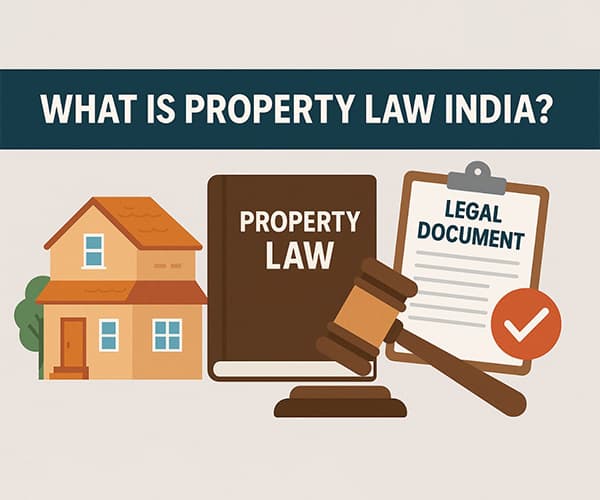What is Property Law in India? Comprehensive Legal Guide

Property is one of the most valuable assets in India, yet it is also one of the most disputed. From inheritance conflicts to real estate transactions, property law in India governs every aspect of ownership, transfer, and rights. But what is property law in India, and why do you need expert legal advice? This property law comprehensive guide India by Vakeel Saab will simplify the key laws, acts, and processes you should know.
Property law in India is an umbrella term that covers the legal framework regulating ownership, transfer, succession, and disputes concerning movable and immovable property. It includes central legislations like the Transfer of Property Act, 1882, the Indian Succession Act, 1925, the Land Acquisition Act, 2013, and more. Whether you’re buying a house, inheriting land, or settling family partitions, consulting a qualified Property Lawyer in India ensures your rights are fully protected. With Vakeel Saab’s Property Lawyer Consultation, you can get clarity on ownership, documentation, and dispute resolution.
What is Property Law in India?
Property law regulates the relationship between individuals and property. It governs who owns property, how it can be transferred, and what rights an owner has. There are two broad categories:
- Movable Property: Assets like vehicles, shares, money.
- Immovable Property: Land, houses, buildings, and real estate.
Key Indian Property Laws
- Transfer of Property Act, 1882: Governs sale, mortgage, lease, and gift of property.
- Partition Act, 1893: Provides legal remedies for partition of joint family or co-owned property.
- Indian Succession Act, 1925: Deals with inheritance, wills, and intestate succession.
- Land Acquisition Act, 2013: Regulates compulsory acquisition of land by the government and compensation to owners.
- Benami Transactions (Prohibition) Act, India: Prohibits property purchases made in the name of another person to conceal ownership.
Property Rights in India
The Indian Constitution guarantees property rights under various statutes, though the “Right to Property” is no longer a fundamental right. Key rights include:
- Right to ownership and possession
- Right to transfer property (sale, gift, lease, mortgage)
- Right to succession and inheritance
- Right to compensation in case of land acquisition
Property Registration vs Ownership
One of the most common misconceptions is that registration automatically guarantees ownership. In reality, property registration vs ownership are separate but related concepts:
- Property Registration: Legal recording of the transaction under the Registration Act, 1908.
- Property Ownership: Actual right over property, which may arise from purchase, inheritance, or gift deed.
This is where guidance from a Property Lawyer in Delhi is invaluable to avoid frauds or disputes.
Common Real Estate and Property Disputes in India
Despite strong laws, real estate property disputes in India are widespread. Common issues include:
- Illegal possession or encroachment
- Inheritance disputes among family members
- Fraudulent property sales or double registrations
- Delay in possession by builders
- Benami transactions
Why Consult a Property Lawyer?
Property transactions involve high value and complex documentation. A Property Lawyer Consultation through Vakeel Saab ensures:
- Verification of property title and ownership records
- Drafting and registration of sale deeds, wills, and agreements
- Representation in property partition and succession disputes
- Guidance in land acquisition compensation claims
- Resolving real estate disputes through litigation or mediation
Frequently Asked Questions (FAQ)
What is the Transfer of Property Act, 1882?
It is the key legislation that governs transfer of immovable property by sale, lease, mortgage, gift, or exchange.
What is the difference between registration and ownership?
Registration records the transaction legally, while ownership establishes actual rights over the property. Both are essential for legal security.
Can I inherit property without a will?
Yes, in such cases, the Indian Succession Act, 1925 applies and the property is distributed as per intestate succession laws.
What is a Benami transaction?
It refers to property purchased in someone else’s name to conceal real ownership. The Benami Transactions Act prohibits such dealings.
How can a Property Lawyer help me?
A Property Lawyer in India can verify documents, prevent fraud, and represent you in disputes involving real estate or inheritance.
Whether you are buying property, facing an inheritance conflict, or dealing with real estate disputes, Vakeel Saab connects you with top Property Lawyers in India. Our expert Property Lawyers in Delhi provide reliable consultation on transactions, disputes, and property rights. Book your property lawyer consultation today to safeguard your most valuable asset.
Related Articles
The Importance of Consulting a Property Lawyer for Real Estate Issues
Blog
How to File a POCSO Complaint in India: Step-by-Step Legal Process
Blog
What punishments does the law give for giving, taking, or asking for dowry?
Blog
Reasons for the Increasing Divorce Rates in India
Blog
What is a Special Leave Petition? Meaning, Features, Process & & Who Can File?
Blog
What Is the Difference Between Mutual Divorce and Contested Divorce?
Blog